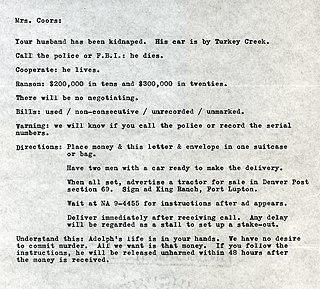
Boko Haram, officially known as Jamā'at Ahl as-Sunnah lid-Da'wah wa'l-Jihād, is an Islamist militant organization based in northeastern Nigeria, which is also active in Chad, Niger, northern Cameroon, and Mali. Boko Haram was the world's deadliest terror group during part of the mid-2010s according to the Global Terrorism Index. In 2016, the group split, resulting in the emergence of a hostile faction known as the Islamic State's West Africa Province.

The Boko Haram insurgency began in July 2009, when the militant Islamist and jihadist rebel group Boko Haram started an armed rebellion against the government of Nigeria. The conflict is taking place within the context of long-standing issues of religious violence between Nigeria's Muslim and Christian communities, and the insurgents' ultimate aim is to establish an Islamic state in the region.

The Vanguard for the Protection of Muslims in Black Africa, better known as Ansaru and less commonly called al-Qaeda in the Lands Beyond the Sahel, is an Islamic fundamentalist Jihadist militant organisation based in the northeast of Nigeria. It originated as a faction of Boko Haram, but became officially independent in 2012. Despite this, Ansaru and other Boko Haram factions continued to work closely together until the former increasingly declined, and stopped its insurgent activities in 2015. Since then, Ansaru is mostly dormant though its members continue to spread propaganda for their cause.
Timeline of the Boko Haram insurgency is the chronology of the Boko Haram insurgency, an ongoing armed conflict between Nigerian Islamist group Boko Haram and the Nigerian government. Boko Haram have carried out many attacks against the military, police and civilians since 2009, mostly in Nigeria. The low-intensity conflict is centred on Borno State. It peaked in the mid 2010s, when Boko Haram extended their insurgency into Cameroon, Chad and Niger.

Between 23 and 25 June 2014, a series of attacks occurred in central Nigeria. On 23–24 June, gunmen attacked a number of villages in Kaduna State, killing around 150 people. The attack was blamed on Fulani tribesmen. On 25 June 2014, a bomb exploded at the Emab Plaza in the national capital of Abuja, killing at least 21 people. In response to the bombing, the Nigerian military raided two militants camps on 26 June, killing more than 100 people.
Religious violence in Nigeria refers to Christian-Muslim strife in modern Nigeria, which can be traced back to 1953. Today, religious violence in Nigeria is dominated by the Boko Haram insurgency, which aims to establish an Islamic state in Nigeria.
The following lists events from 2014 in Nigeria.
The following lists events that happened in 2013 in Nigeria.
The Abuja DSS attack was a coordinated terrorist attack by the Islamic group Boko Haram on the Department of State Security, Abuja on 31 March 2014 in a bid to escape from detention. This resulted in the death of 21 insurgents who attempted to escape leaving 2 security personnel severely injured.

Kidnapping is a major problem in Nigeria in the early 21st century. Kidnapping by bandits and insurgents is among the biggest organised or gang crime in Nigeria and is a national security challenge.
On 23 March 2020, Islamists carried out massacres of soldiers in Chad and Nigeria.
The following is a list of events in 2021 in Nigeria.

Since 2015, the border area between Burkina Faso, Mali, and Niger has been a hotbed for jihadist forces originating from Mali. The insurgency has taken place in two distinct regions of Niger. In southwest, the Islamic State in the Greater Sahara and the Nusrat al-Islam have carried out attacks in the tri-border area with Burkina Faso and Mali. Meanwhile, in the southeast, the Islamic State in the West African Province has established control in parts of southern Niger.

The bandit conflict in northwest Nigeria is an ongoing conflict between the country's government and various gangs and ethnic militias. Starting in 2011, the insecurity remaining from the conflict between the Fulani and Hausa ethnic groups quickly allowed other criminal and jihadist elements to form in the region.
Events in the year 2022 in Nigeria.
On 28 March 2022, an Abuja–Kaduna train was attacked in Katari, Kaduna State, Nigeria. In response, the Nigeria Railway Corporation (NRC) briefly halted operations along the route.

On 10 April 2022, a gang of bandits killed more than 150 people in a series of attacks in Plateau State, Nigeria. The attacks are linked to the ongoing Nigerian bandit conflict. About 70 people were also kidnapped in the attacks.

An Islamist insurgency has been ongoing in the Sahel region of West Africa since the 2011 Arab Spring. In particular, the intensive conflict in the three countries of Mali, Niger and Burkina Faso has been referred to as the Sahel War.
On June 30, 2022, gunmen ambushed Nigerian soldiers responding to a distress call of an attack on a mining village. Forty-eight people died, including thirty-four soldiers, eight policemen, and six civilians. The attack is one of the deadliest ambushes in Nigeria in recent years.








